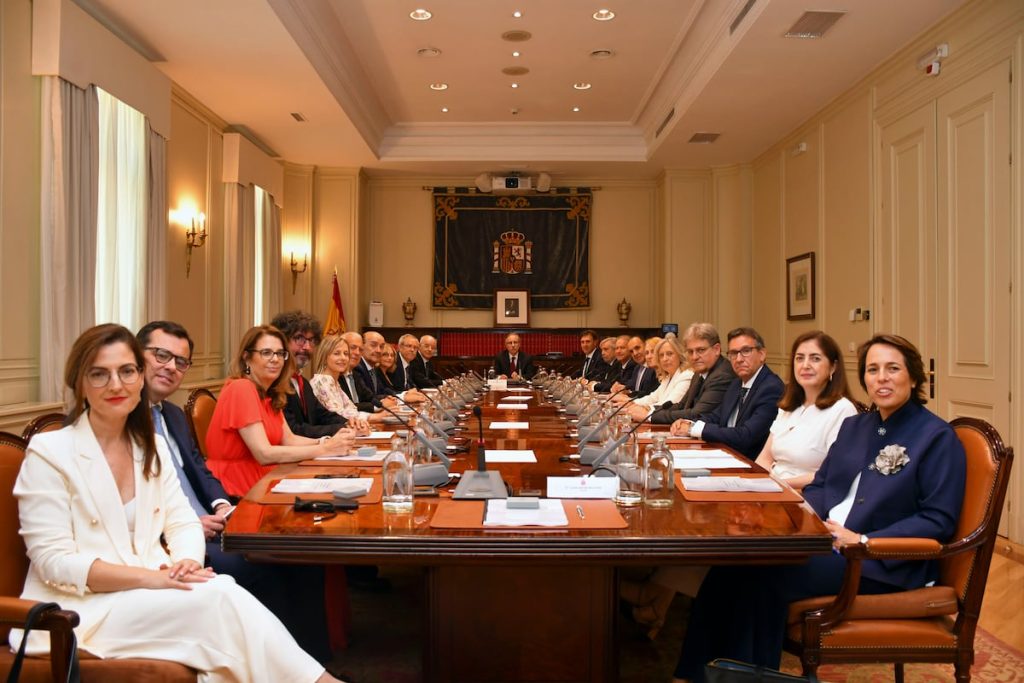A new clash has occurred within the General Council of the Judiciary (CGPJ) in Spain. The members of the judicial government body proposed by the Popular Party attempted on Monday, unsuccessfully, to have the Plenary session defend “judicial independence against certain attacks from members of the Executive power”, referring to criticisms made by the Minister of Transport, Óscar Puente, towards the Supreme Court regarding an amnesty law. Judicial sources explained that this point was not included in the agenda. The Plenary did, however, approve 112 agreements on urgent matters that could not wait for the appointment of a new president for the judiciary body. The CGPJ continues to delay the appointment of a president even though the start of the judicial year is only two weeks away.
The document that was not approved stated that since the formation of the new CGPJ on July 25, there have been “public statements made by government members” which the 10 signatories consider to go beyond “the legitimate use of freedom of expression and moderate and rational criticisms of judicial rulings, which can always be challenged through legal channels”. The vocal members José Luis Costa, José Antonio Montero, Pilar Jiménez, Eduardo Martínez, Gema Espinosa, José María Páez, Esther Rojo, Carlos Orga, Isabel Revuelta, and Alejandro Abascal criticize claims that the Supreme Court “overstepped its bounds in interpreting a law”, referring to the amnesty law. Minister Puente had stated in an interview that the Court’s interpretation of the law exceeded its limits by suggesting malfeasance on the part of Catalan separatists.
The signatories emphasized that interpreting laws is the main function attributed to judicial bodies by the Constitution. They lamented the attribution of an interpretation that is “incomprehensible”, and the announcement that this interpretation would not prevail, but would only delay the implementation of the law until the Constitutional Court pronounces on it. According to the document, these statements, along with other criticisms made in the media, go beyond the limits required by the separation of powers and respect among them. Such statements only serve to wear down the Justice system and question its independence, which is essential for democracy and the Rule of Law.
The document proposed that the Plenary express “its strongest rejection of the aforementioned statements”, and make “a new call for restraint and prudence in criticizing judicial rulings in particular and the Judiciary in general”, while also requesting “that those responsible refrain from making statements in similar terms”. The signatories considered the statements made by high-ranking institutional figures to be especially serious, as they ignore previous calls for caution and respect towards the judiciary, as highlighted in the Report on the Rule of Law in Spain in 2024 by the European Commission. The signatories emphasized that a democratic State cannot exist without an independent Judicial Power that is perceived as such by the citizens.
The ongoing conflict within the CGPJ highlights the tension between the Executive and the Judiciary in Spain. The inability to reach a consensus on key issues, such as defending judicial independence and appointing a new president, raises concerns about the state of democracy and the rule of law in the country. The clash between government officials and judicial authorities underscores the importance of separation of powers and respect for each branch of government. The ongoing disagreements within the CGPJ may have wider implications for the functioning of the judiciary and the perception of justice in Spain.


